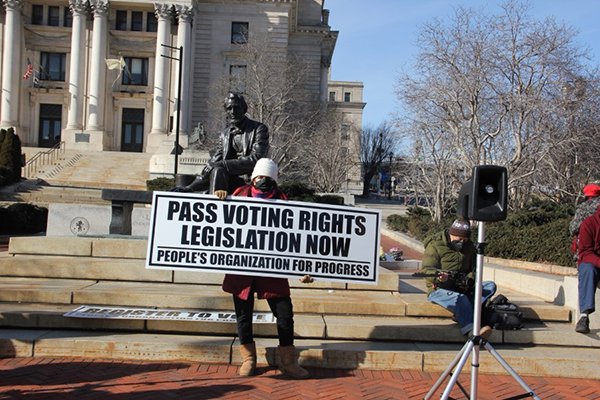Democracy and Politics News
The U.S. news cycle proves to be a continuing barrage of the absurd and alarming. Unclaimed drones share headlines with warnings of a looming purge of civil servants and replacement by reprobate sycophants. At the same time, relentless coverage of an alleged 26-year-old assassin hints at the undercurrent of an unspoken rage, even among those assailed as being “woke.”
Though New Jersey has taken important steps to expand access to the ballot in recent years, many barriers still exist that disproportionately harm communities of color. For our state to live up to its values, transformational change is needed to ensure that voting rights are protected and expanded for all New Jerseyans.
Mona Dalia and Ghada Elnajjar are members of the NVFG movement and supported the campaign from their respective home states. Both offered some personal insights, experiences, and visions for the future of their ancestral homeland and their transplanted homeland, the U.S.
The NJ Uncommitted movement, after earning over 40,000 votes during the New Jersey Democratic primaries in June, reemerged as No Votes for Genocide (NVFG) launched on September 1. The organization, led by Mona Dalia, a Palestinian healthcare worker and organizer, and Martina Manicastri is an organizer with Central New Jersey DSA; with the support of Ghada Elnajjar, a political activist and community organizer with the “No Peace, No Peach” movement out of Georgia.
In this interview, Public Square Amplified community reporter Alaa Essafi speaks with Amol Sinha, executive director of the ACLU-NJ, about the types of legal advocacy being utilized to ensure immigrant rights are protected, ongoing immigration policy campaigns, and ways to promote civic engagement leading up to the 2024 presidential election.
The bustling intersection at Broad and Market Streets is a prime location for shopping, featuring a variety of department stores and street vendors. It’s also a public transportation thoroughfare making it an ideal spot to engage with folks.
On Sunday, September 22, the New Jersey Society of Professional Journalists (NJSPJ) hosted a webinar with the Executive Director and Editor of HonestReporting.com, Gil Hoffman. Initially suggested by Steve Lubetkin, NJSPJ board secretary, then championed by Kenneth Burns, board president, it is unclear how much research and effort was made to ensure the guest was appropriate for the topic.
On Wednesday, August 28th, a coalition of abolitionists and organizers hosted an annual commemoration of Black August at The HUBB in Orange that brought together political prisoners, academics, returning citizens, and fellow community members.
Debates at city hall have been called lots of things by lots of people — obfuscatory, corrupt, insulting, biased, protective of special interests, among countless others. But the discourse has rarely been called or considered “art.” In New Brunswick, coLAB Arts is implementing a new program, “Documenters,” part of a nationwide effort, to provide community residents with reports on the discussions and decisions that occur at public meetings. But coLAB Arts isn’t stopping there — it also plans to leverage the reporting to inspire and support the creation of art. Ultimately, this art inspires, catalyzes and drives community engagement — a key aspect of the organization’s mission.
In our final installment, three women journalists discuss the importance of owning one’s narrative and identity within a media landscape grappling with the construct of modern journalism — ideas that shape many of the concepts confronting white and non-White journalists including inclusivity, bias and objectivity.
In this exclusive column for Public Square Amplified, senatorial candidate Lawrence Hamm, founder of the People’s Organization for Progress, explains his decision to vote “uncommitted” in the upcoming New Jersey presidential primary, taking place June 4. Hamm is the only candidate in the primary who has said he will vote “uncommitted” to protest the war in Gaza.
In part one of this series, we featured stories of success, struggle and purpose from three remarkable women journalists who built their careers in primarily white-male-dominated newsrooms. For part two, we sat down with three more remarkable women journalists in the state working to establish a more equitable and inclusive media landscape that centers the narratives of communities being pushed to exist on the periphery of mainstream media.
In light of the importance of journalism for a cohesive civil society, healthy democracy, well-informed public and transparent government, some of New Jersey's most remarkable women journalists reporting on cities and communities around the state will share their stories of success, struggle, purpose and wisdom: What drives their work despite the challenges, the importance of white and non-white women in journalism, and tips and insights for others looking for support and inspiration in the field.
Older Democracy and Politics Articles
New Jersey Bakers find the recipe for entrepreneurship
On January 10, 2022, legislation was passed by both the state Assembly and Senate to codify Cottage Food production regulations set forth by an administrative rule change that went into effect in October 2021. This was a culmination of efforts by food freedom proponents throughout New Jersey—work that took more than a decade— to see the state end its holdout as the last with a ban on the sale of homemade foods.
Subscribe to Public Square Amplified.
Your community is us.














